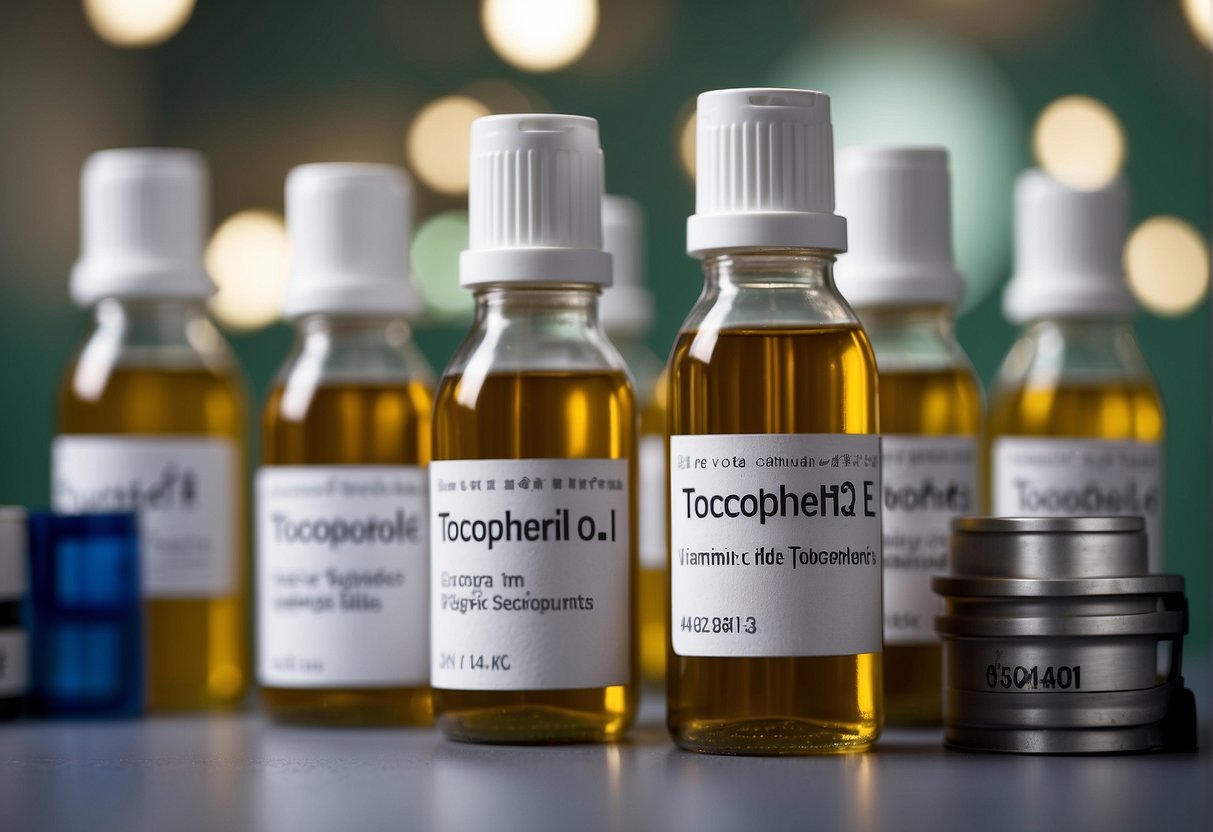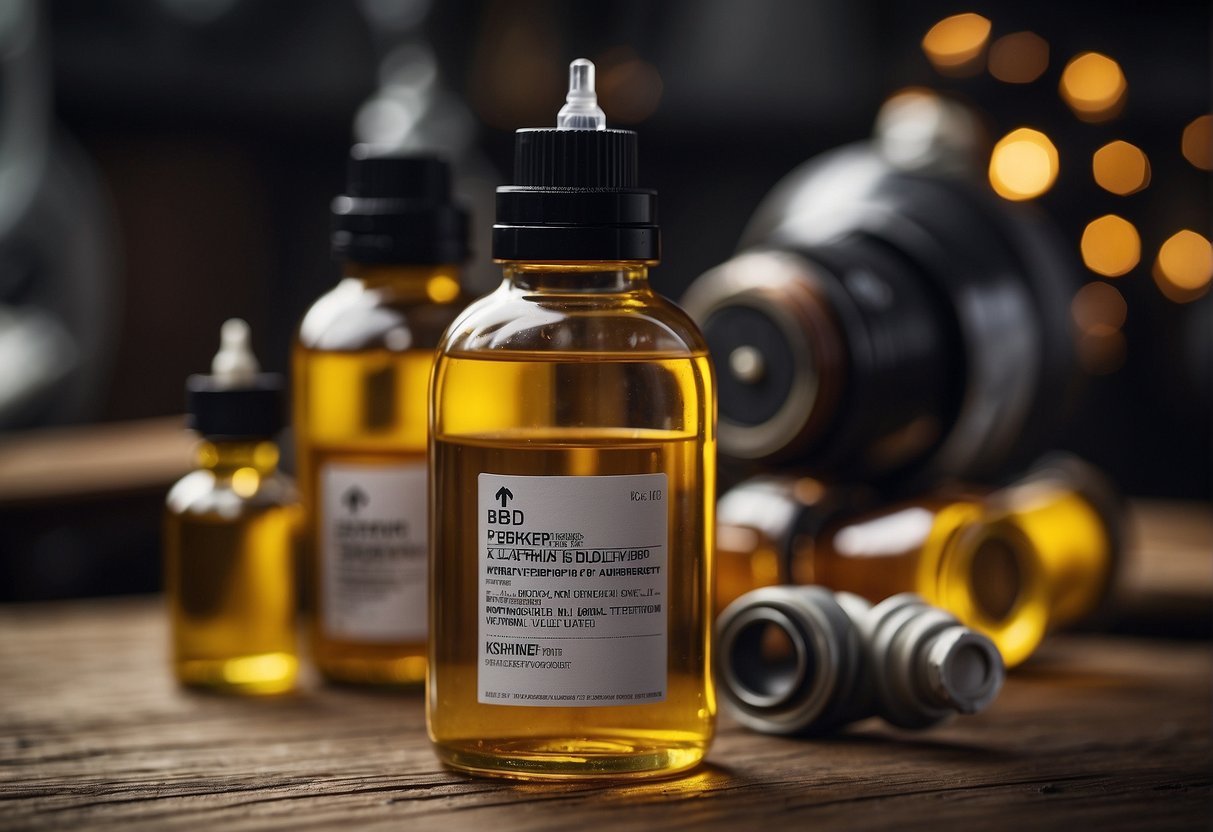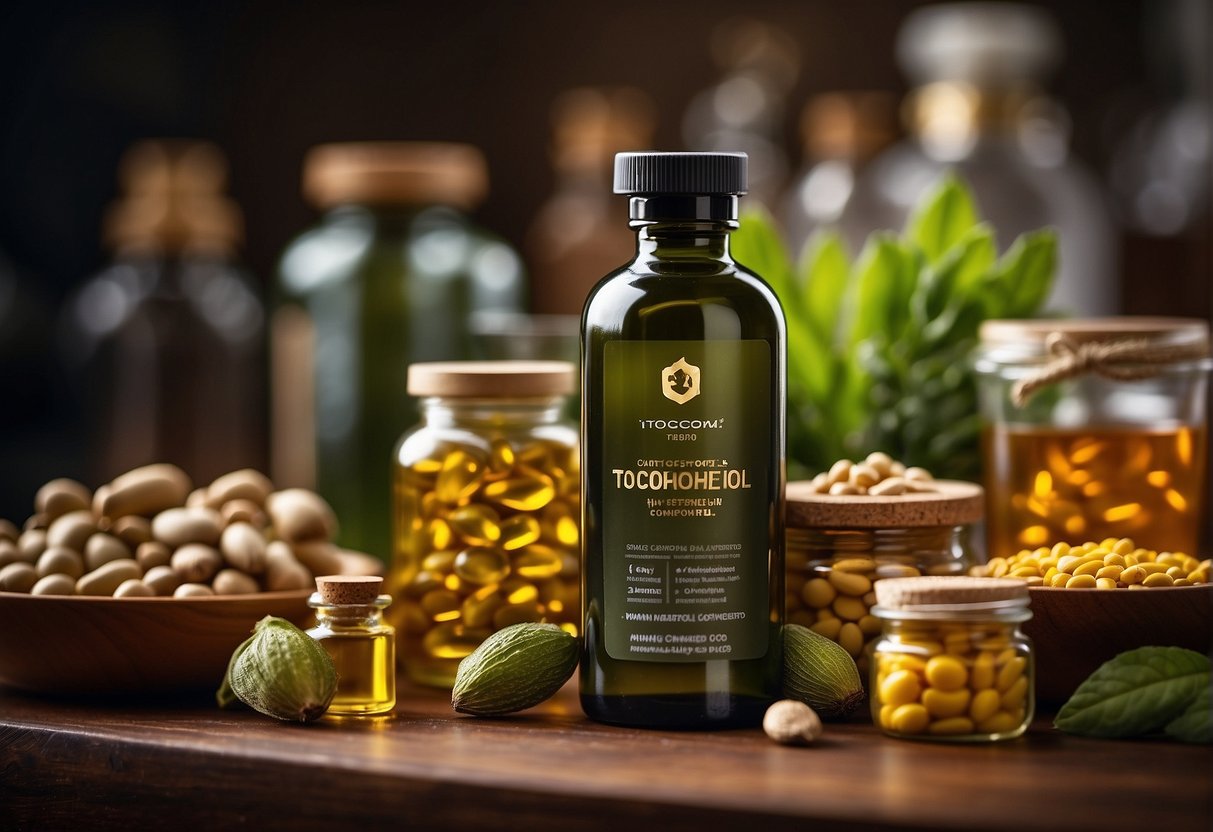What is Tocopherol: Unveiling Vitamin E Essentials
Tocopherol, commonly known as vitamin E, is a fat-soluble nutrient found in many foods and available as a dietary supplement. It acts as an antioxidant, helping to protect cells from the damage caused by free radicals. Free radicals are compounds formed when our bodies convert the food we eat into energy.

We might also obtain tocopherols through consumption of a variety of nuts, seeds, green leafy vegetables, and vegetable oils. They play a crucial role in immune function, skin health, and cell signaling. While deficiency is rare, ensuring an adequate intake is important for maintaining overall health.
High doses of tocopherol supplements can pose potential risks, such as an increased chance of bleeding due to its blood-thinning effect. We therefore advise cautious use, particularly if you have a vitamin K deficiency or are on blood thinners. Balance through diet and possibly supplementation can achieve optimal levels of tocopherol for most individuals.
Key Takeaways
- Tocopherol is an antioxidant essential for protecting cells.
- It boosts immune function and skin health through food sources and supplements.
- Responsible consumption is vital as over-supplementation may lead to health risks.
Basics of Tocopherols

We'll examine the structure and different forms of tocopherols, shedding light on their unique chemical properties. These insights are essential for understanding their biological functions and applications.
Chemical Structure and Variants
Tocopherols are a class of organic molecules consisting of a chromanol ring and a phytyl tail. There are four variants of tocopherols—alpha (α), beta (β), gamma (γ), and delta (δ)—distinguished by the number and position of methyl groups on the chromanol ring. Alpha-tocopherol is the most biologically active isomer, vital for its antioxidant properties.
The chemical structure of tocopherols is characterized by a saturated phytyl tail, which differs from tocotrienols that have an unsaturated isoprenoid side chain. This structural difference imparts distinctive biological functions to tocopherols and tocotrienols. Tocopherols are lipophilic antioxidants, protecting cellular membranes from oxidative damage by scavenging free radicals.
Each tocopherol variant exists as several stereoisomers, which are molecules with the same molecular formula but a different spatial arrangement of atoms. The biological activities of these isomers can vary significantly, with some forms being more potent than others. In dietary supplements, γ-tocopherol is often found alongside alpha-tocopherol, as it is common in the American diet and contributes to the antioxidant activity.
Vitamin E Essentials

Vitamin E, specifically in the form of alpha-tocopherol, plays a crucial role in protecting cells from oxidative stress. As a potent antioxidant, it neutralizes free radicals, supporting overall health.
Functions in the Body
The primary function of Vitamin E is to act as an antioxidant. It safeguards cellular structures against damage from free radicals, which are unstable compounds that can harm cells and contribute to chronic diseases and aging. In synergy with Vitamin C, another antioxidant, Vitamin E helps to regenerate its antioxidant capacity, enhancing the body's defensive mechanisms.
Dietary Sources and Requirements
Dietary sources of Vitamin E include a variety of vegetable oils, such as sunflower, safflower, and canola oil, nuts, seeds, and green leafy vegetables. The Institute of Medicine establishes the Recommended Dietary Allowance (RDA) for adults as 15 milligrams of alpha-tocopherol per day.
| Food Source | Vitamin E Content (mg) |
|---|---|
| Sunflower seeds, 1oz | 7.4 |
| Almonds, 1oz | 6.8 |
| Spinach, 1 cup | 3.7 |
For those unable to meet their needs through diet alone, supplements in the form of tocopheryl acetate or alpha-tocopherol can be taken, but it's essential to adhere to the guidance of healthcare providers, as high doses can have adverse effects. Vitamin E deficiency is rare but can lead to neurological problems due to oxidative damage.
Health Benefits of Tocopherol

Tocopherol, commonly known as Vitamin E, plays a crucial role in protecting cells from oxidative damage and improving overall health. We'll explore its various health benefits, substantiated by scientific evidence, across four distinct categories.
Antioxidant Properties and Cellular Protection
Tocopherol is a powerful antioxidant that helps preserve cell membranes from oxidative stress caused by free radicals. By donating electrons to free radicals, tocopherol aids in stabilizing them and preventing cellular damage. This antioxidant activity is especially important in maintaining immune function and mitigating inflammation within the body.
Heart Health and Circulation
Our cardiovascular system benefits from tocopherol through its anti-inflammatory effects, which may contribute to the prevention of atherosclerosis—the buildup of plaques in the arteries. Some studies suggest that tocopherol can improve circulation and potentially reduce the risk of heart disease by inhibiting the oxidation of low-density lipoprotein (LDL) cholesterol, a key factor in the development of cardiovascular disease.
Ocular Health
Age-related macular degeneration and cataracts are two common eye conditions that may be positively impacted by tocopherol's antioxidant properties. By defending against oxidative stress, tocopherol contributes to the health of our eyes and may help slow the progression of these age-related diseases.
Skin Nourishment
Tocopherol is a vital ingredient in skin care due to its ability to nourish and protect the skin. Found in natural oils such as sunflower oil, wheat germ oil, and soybean oil, it supports skin health by offering protection against ultraviolet light and by exerting an anti-inflammatory effect, which can alleviate skin issues and improve the complexion.
Potential Risks and Side Effects

In this section, we discuss the potential risks and side effects associated with the use of tocopherol, commonly known as vitamin E. It's important to be informed about the limits of recommended intake and the possible interactions this nutrient may have with other substances.
Toxicity and Overuse
Despite its many benefits, consuming high doses of vitamin E supplements can lead to toxicity. According to the Nurses' Health Study and the Health Professionals Follow-up Study, excessive intake could result in bleeding problems due to vitamin E's effect on platelets and anticoagulation mechanisms. The Recommended Dietary Allowance (RDA) for vitamin E should be adhered to, as surpassing it might lead to hemorrhagic strokes or other bleeding issues.
Interactions and Counteractions
Vitamin E can also interact with other substances. For instance, while ascorbic acid, or vitamin C, may work synergistically with vitamin E, other combinations might not be as favorable. The Selenium and Vitamin E Cancer Prevention Trial (SELECT) found no benefits in preventing cancer when vitamin E was combined with selenium. Patients on anticoagulant therapy especially need to monitor their vitamin E intake, as it can affect the efficacy and safety of their medication.
Sources and Selections

To ensure comprehensive understanding, we'll discuss the distinctions between natural and synthetic tocopherols, as well as how to assess their quality and bioavailability.
Natural vs. Synthetic Forms
Tocopherols, known collectively as vitamin E, are found naturally in various foods such as seeds, nuts, and vegetable oils. Natural sources like almonds and sunflower seeds are particularly rich in alpha-tocopherol, the most bioavailable form. Synthetic tocopherol, labeled as 'dl-alpha-tocopherol,' is often used to fortify foods and provide vitamin E in supplements, but it is not as easily utilized by the body as the natural 'd-alpha-tocopherol'.
Evaluating Quality and Bioavailability
When evaluating tocopherol quality, it's essential to consider the source. Cold-pressed, organic oils tend to provide higher tocopherol quality due to minimal processing. The bioavailability of tocopherols is significant — natural sources are typically more bioavailable, meaning they are more readily absorbed and utilized by the body. Bioavailability is influenced by various factors, including the form of tocopherol and the presence of dietary fat, which enhances absorption.
Frequently Asked Questions

Tocopherol, commonly known as vitamin E, plays an essential role in our body's antioxidant defenses and cellular functions. Below, we address common questions to provide clarity on the importance and effects of tocopherol consumption.
What are the health benefits of consuming tocopherol?
Tocopherol acts as a potent antioxidant, protecting cells from damage caused by free radicals. Consuming adequate amounts supports our immune system, eye health, and skin integrity.
How much vitamin E is considered safe per day?
The recommended dietary allowance (RDA) for vitamin E, which includes tocopherol, is 15 milligrams for adults. To avoid potential health risks, we should not exceed the upper limit of 1,000 milligrams of alpha-tocopherol per day.
Why is tocopherol commonly added to food products?
We often find tocopherol added to food products as a natural preservative because it prevents the oxidation of fats, helping to prolong shelf life and maintain nutritional quality.
Can you distinguish between natural and synthetic forms of tocopherol?
The natural form of vitamin E is denoted as d-alpha tocopherol, while the synthetic form is labeled as dl-alpha tocopherol. The natural form is more bioavailable and has higher nutritional value than its synthetic counterpart.
What are the signs of vitamin E deficiency?
Signs of deficiency often include peripheral neuropathy, muscle weakness, and impaired immune response. Serious long-term deficiency can also lead to vision problems and neurological issues.
How is tocopherol derived or produced?
Natural tocopherols are extracted from vegetable oils, nuts, and seeds, while synthetic variants are commonly produced through chemical synthesis of petroleum derivatives.